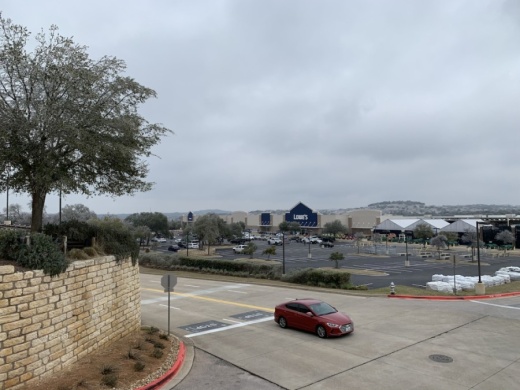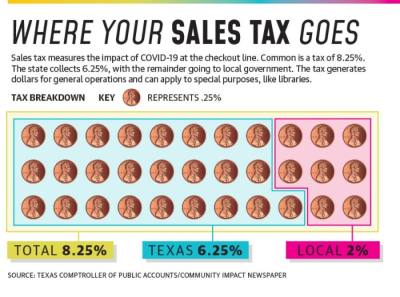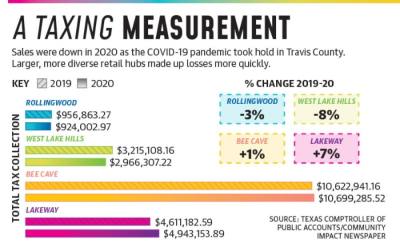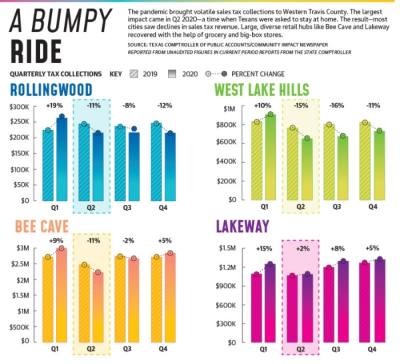The pandemic has hit businesses hard in some industries, which report a drop in returning customers and declining sales, while others have actually seen benefits from lockdowns and the shift to working from home offices.
Local governments also responded to these changing trends, as businesses reacted to onsite shutdowns in the spring. Cities reduced revenue projections and pulled back spending for the 2020-21 fiscal year.
For local business owner Laura Chavez, who operates Junkluggers of Austin, the past year was a strong one.
Her team was busy in 2020 with customers removing unused office furniture, and residential customers making room for home offices and play areas, she said.
“My businesses did thrive during COVID, so I am really grateful,” she said. “We took a big hit in March and April, and then in May we were doubling our year-over-year business.”
Food service had a different experience, said Robert Siller, who co-owns and operates Texas Honey Ham Co. in West Lake Hills.
“We were down significantly from the year before. And restaurants have small margins,” he said.
Making up for lost sales is not simply a matter of cutting employees, Siller said. Such a decision often leads to losing team members who move to other employment.
An up-and-down impact
Looking at unemployment data in Texas shows some recent improvement but may not reflect decisions like Siller’s to protect jobs. Unemployment figures for Texas and for the Austin-Round Rock metro stand at 7.1% and 5.1%, respectively. Both are improvements from November 2020; however, those figures are up nearly 4 and 3 points, respectively, from November 2019—before the pandemic.
Another perspective comes from a review of local sales tax revenue, which tracks activity by taxing transactions at the checkout aisle. The state collect 6.25% of the tax and sends up to 2% to local governments.
Local sales tax dollars from cities in western Travis County from 2020 show local communities saw volatility when compared to 2019. And it came as businesses wrestled with changing business operations and consumers’ altered behavior.
From 2019-20, Rollingwood and West Lake Hills saw yearly declines of 3% and 8%, respectively, in sales tax collections, according to the Texas State Comptroller. However, larger retail hubs in Lakeway and Bee Cave were more resilient, contributing to single-digit annual growth in those cities. In the case of Bee Cave, that growth was 1%, and Lakeway was 7% when comparing 2020 to 2019.
Looking more closely, western Travis County cities saw a drop-off in sales activity in the second quarter of 2020 as the pandemic took hold and widespread shutdowns of on-site business took effect.
For example, in the first quarter of 2020, Bee Cave saw sales tax collections increase 9%, but then collections dropped off in the second quarter, showing a 11% annual decline. In the back half of the year, the pattern slowly stabilized. Lakeway also saw a similar pattern.
That kind of performance is unusual and a sign of a turbulent marketplace, Lakeway City Manager Julie Oakley said.
“We really did a good job during the budget cycle accounting for that volatility; so we are just working the plan,” Oakley said. “I can tell you all the grocery sales and online sales are high enough that they are covering the downside for our retailers who are not doing as well,” Oakley said. “Grocery stores and online sales are doing better than they ever have.”
Retail diversity softens the blow
A review of sales tax permit holders from the state comptroller shows that Lakeway benefits from H-E-B and Randalls as well as a few smaller markets contributing to tax revenue. Similarly, Bee Cave benefited from its own H-E-B as well as a Whole Foods Market. But both cities also have diversified retailers not present in the smaller commercial centers in Rollingwood and West Lake Hills.
Lakeway has restaurants and professional services, but also manufacturing, auto repair, wholesale and construction businesses. A similar review of Bee Cave again shows this diversity. By comparison, a smaller city like Rollingwood lacks the number of outlets generating sales tax, and, as with West Lake Hills, lacks the degree of economic diversity.
By way of example, in Rollingwood, a Trader Joe’s supermarket did its part to bolster the local economy during a difficult period, said Abel Campos, director of finance for Rollingwood. In May 2020 the city saw sales tax collections increase 22% annually. But it wasn’t to last.
"We are really not that big of a commercial sector,” he said. “We have Trader Joe’s, and I believe that is what caused an uptick in May. People stocked up on food and groceries, and you name it. It looks like after everyone stocked up, it trails off, and that month begins to look like more of an aberration.”
Municipal government reacts
In the face of uncertainty, most cities in 2020 implemented conservative budgets with lowered revenue and spending plans.
For example, Bee Cave eliminated nearly all capital improvements from its budget.
One outcome of that decision was to suspend early negotiations for a new police headquarters, Bee Cave City Manager Clint Garza said.
“There are no major building projects in the budget. We put the police department on hold because we just didn’t know what would happen,” Garza said. “I’d say we are being as responsible as we can.”
The tone is echoed by Travis Askey, city administrator in West Lake Hills. City government had to be conservative during 2020, he said.
“In government, we follow the trends slowly,” he said. “We are just a different animal than private business. That’s why when you first see the signs, you have to throttle back and hunker down.”
A new reality
For business owners like Siller, 2020 was about improving curbside service, and now he will bring in third-party delivery services such as Grubhub to recover lost business.
“People are not coming in like they used to, and, of course, we have no catering going on,” he said. “We used to feed all the offices in the neighborhood. We didn’t have any holiday parties, and our weekly boxed lunches and buffets are not happening because no one is in their offices. Everyone is working from home.”
That focus on the home, while challenging Siller, benefits Chavez and her Junkluggers business. It helped not only those hauling items away, but also those selling new home furniture.
Greg and Joni Greeson, who own Collectic Home + Office, did see an overall increased interest in the home.
“Home furnishings ended up being a bright spot in general, as consumers found themselves with more disposable income due to decreased spending on dining and travel and the desire to upgrade home decor,” Greeson said.
But Greeson, like Siller and Chavez, said 2021 is no time for business owners to grow complacent.
“Whatever you were doing in 2019, that probably now no longer applies exactly as it did in the ‘before times,’” he said.








